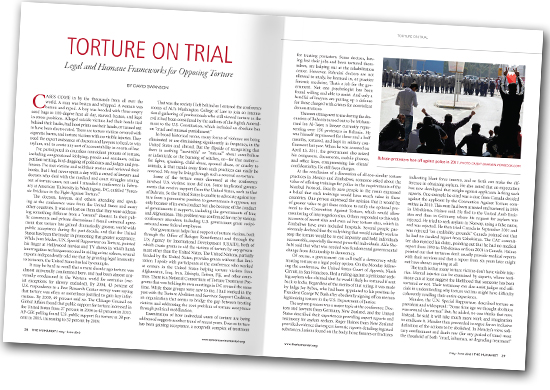I’ve participated in countless nonviolent protests of torture, including congressional lobbying, panels and seminars, online petition writing, bird-dogging of politicians and judges and professors. I’ve met victims and told their stories and reviewed their books. But I had never spent a day with a crowd of lawyers and doctors who deal with the medical and court struggles arising out of torture cases, not until I attended a conference in February at American University in Washington, DC, entitled “Forensic Evidence in the Fight Against Torture.”
The doctors, lawyers, and others attending and speaking at the conference were from the United States and many other countries. It was not lost on them that they were addressing something different from a “natural” disaster. In their public comments and private discussions I found universal agreement that torture has gained dramatically greater, world-wide public acceptance during the past decade, and that the United States has been the leader in promoting that greater acceptance. While Juan Mendez, U.N. Special Rapporteur on Torture, pointed his finger at Hollywood movies and TV shows in which harsh interrogation techniques succeed in aiding crime solvers, several experts independently told me that by granting legal immunity to torturers, the United States has led by example.
It may be hard to recall that a mere decade ago torture was almost universally condemned here, and had been almost universally condemned in the Western world for centuries (racist exceptions for slavery excluded). By 2004, 43 percent of U.S. respondents to a Pew Research Center survey were saying that torture was often or sometimes justified to gain key information. By 2009, 49 percent said so. The Chicago Council on Global Affairs found that public support for torture increased in the United States from 27 percent in 2004 to 42 percent in 2010. AP-GfK polling found U.S. public support for torture at 38 percent in 2005, increasing to 52 percent by 2009.
That was the society I left behind as I entered the conference rooms of AU’s Washington College of Law to join an international gathering of professionals who still viewed torture as the evil it had been considered by the authors of the Eighth Amendment to the U.S. Constitution, which included an absolute ban on “cruel and unusual punishment.”
 Texas School District(s) Allow Male Administrators to Paddle Female Students
Texas School District(s) Allow Male Administrators to Paddle Female Students

 We are delighted that we can inform you that earlier today, President Correa started the meeting at the Presidential Palace in Quito, Ecuador, by announcing that Ecuador will no longer send its soldiers to the School of the Americas (SOA/ WHINSEC). This is a tremendous victory for the human rights community across the Americas!
We are delighted that we can inform you that earlier today, President Correa started the meeting at the Presidential Palace in Quito, Ecuador, by announcing that Ecuador will no longer send its soldiers to the School of the Americas (SOA/ WHINSEC). This is a tremendous victory for the human rights community across the Americas!
 The National Religious Campaign Against Torture (NRCAT) is joining with a national coalition of religious and human rights groups in a National Week of Action Against Torture, Guantanamo and the NDAA. Co-sponsoring organizations are listed below.
The National Religious Campaign Against Torture (NRCAT) is joining with a national coalition of religious and human rights groups in a National Week of Action Against Torture, Guantanamo and the NDAA. Co-sponsoring organizations are listed below. 

 America Come Home
America Come Home







